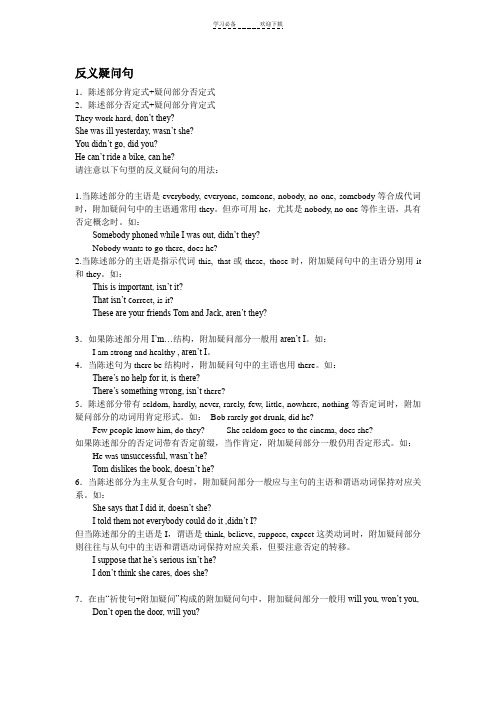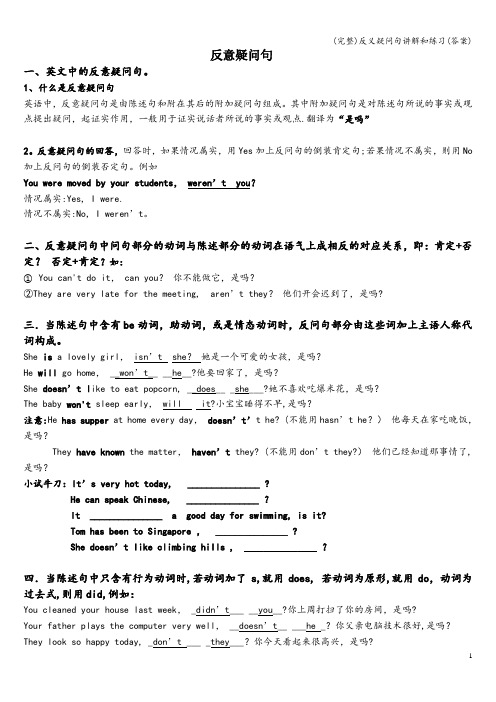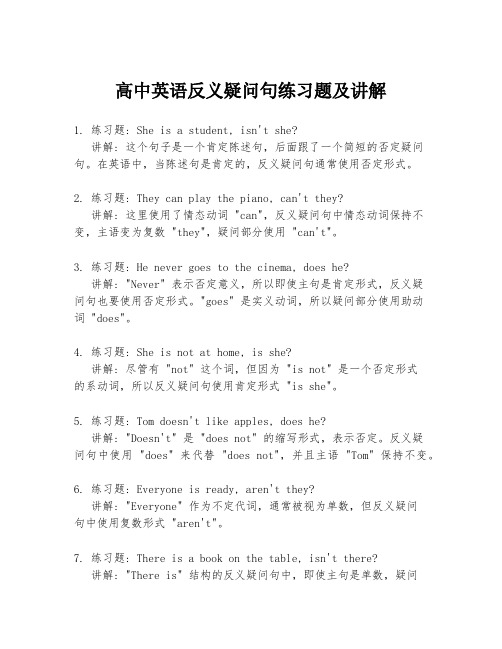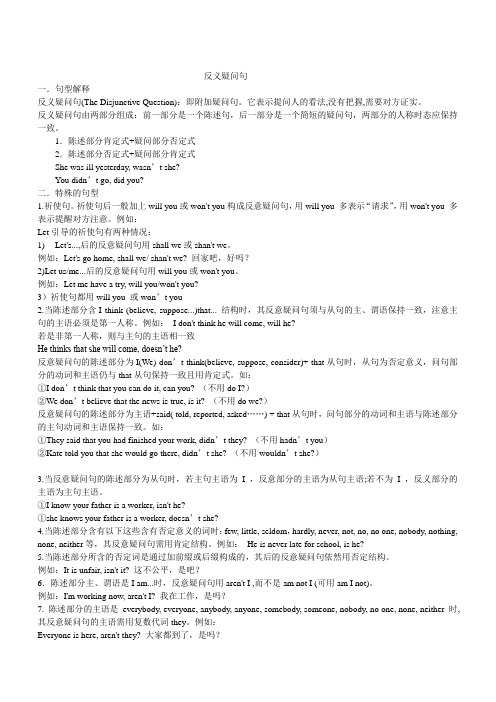英语反义疑问句全解+习题
反义疑问句详解及练习和答案

反义疑问句1.陈述部分肯定式+疑问部分否定式2.陈述部分否定式+疑问部分肯定式They work hard, don’t they?She was ill yesterday, wasn’t she?You didn’t go, did you?He can’t ride a bike, can he?请注意以下句型的反义疑问句的用法:1.当陈述部分的主语是everybody, everyone, someone, nobody, no one, somebody等合成代词时,附加疑问句中的主语通常用they。
但亦可用he,尤其是nobody, no one等作主语,具有否定概念时。
如:Somebody phoned while I was out, didn’t they?Nobody wants to go there, does he?2.当陈述部分的主语是指示代词this, that或these, those时,附加疑问句中的主语分别用it 和they。
如:This is important, isn’t it?That isn’t c orrect, is it?These are your friends Tom and Jack, aren’t they?3.如果陈述部分用I’m…结构,附加疑问部分一般用aren’t I。
如:I am strong and healthy , aren’t I。
4.当陈述句为there be结构时,附加疑问句中的主语也用there。
如:There’s no help for it, is there?There’s something wrong, isn’t there?5.陈述部分带有seldom, hardly, never, rarely, few, little, nowhere, nothing等否定词时,附加疑问部分的动词用肯定形式。
人教版四年级英语反义疑问句练习题30题含答案解析

人教版四年级英语反义疑问句练习题30题含答案解析1.She is a student, isn't she?A.is sheB.isn't sheC.are sheD.aren't she答案解析:B。
反义疑问句的构成是前肯后否,前否后肯。
本题中前面是肯定句“She is a student.”,后面要用否定形式“isn't she”。
A 选项“is she”不是否定形式;C 选项“are she”主谓不一致;D 选项“aren't she”主语和谓语不一致。
2.He likes playing football, doesn't he?A.does heB.doesn't heC.is heD.isn't he答案解析:B。
前面“He likes playing football.”是肯定句,后面要用否定形式“doesn't he”。
A 选项“does he”不是否定形式;C 选项“is he”和D 选项“isn't he”与前面的谓语动词不一致。
3.They are in the classroom, aren't they?A.are theyB.aren't theyC.is they答案解析:B。
前面“They are in the classroom.”是肯定句,后面要用否定形式“aren't they”。
A 选项“are they”不是否定形式;C 选项“is they”和D 选项“isn't they”主谓不一致。
4.We have a new teacher, don't we?A.do weB.don't weC.have weD.haven't we答案解析:B。
前面“We have a new teacher.”是肯定句,后面要用否定形式“don't we”。
四年级英语反义疑问句练习题30题(答案解析)

四年级英语反义疑问句练习题30题(答案解析)1. You are a student, aren't you?答案解析:这是一个be动词(are)引导的反义疑问句。
反义疑问句的构成规则是:前半句是肯定陈述句,后半句则用否定的简短问句。
前半句“You are a student”是肯定句,所以后半句用“aren't you”。
2. He is a good boy, isn't he?答案解析:此题为be动词(is)引导的反义疑问句。
根据规则,前句为肯定陈述,后句要用否定疑问形式。
这里前半句“He is a good boy”是肯定的,所以后面是“isn't he”。
3. She was at school yesterday, wasn't she?答案解析:这是be动词((was)引导的反义疑问句。
由于前半句“She was at school yesterday”是肯定句,反义疑问句的后半句就要用否定形式“wasn't she”,这是遵循前肯后否的原则。
4. They like apples, don't they?答案解析:这里是助动词((do)引导的反义疑问句。
因为前半句“They like apples”是一般现在时的肯定陈述句,且句中的动词“like”是实义动词,所以反义疑问句的后半句要用助动词do的否定形式“don't they”。
5. We have a new book, don't we?答案解析:这是助动词((do)引导的反义疑问句。
前半句“We have a new book”是一般现在时的肯定句,其中“have”在这里是实义动词,按照规则,后半句要用助动词do的否定形式“don't we”。
6. Tom can swim, can't he?答案解析:这是情态动词((can)引导的反义疑问句。
四年级英语反义疑问句练习题30题带答案

四年级英语反义疑问句练习题30题带答案1. He is a student, isn't he?答案:是。
解析:在这个反义疑问句中,前面的陈述部分“He is a student”是肯定句,根据反义疑问句的规则,肯定句后面的疑问部分要用否定形式,所以是“isn't he”。
这里be动词是is,疑问部分就将is变为否定形式isn't,然后加上主语he。
2. She is happy, isn't she?答案:是。
解析:陈述部分“She is happy”为肯定句,按照规则,反义疑问句的疑问部分要用否定形式。
be动词是is,否定形式为isn't,再加上主语she。
3. It is a cat, isn't it?答案:是。
解析:前面陈述部分“It is a cat”是肯定句,对于这种以be动词is构成的肯定句,反义疑问句的疑问部分为否定形式,即把is变为isn't,再加上主语it。
4. You are a good boy, aren't you?答案:是。
解析:陈述部分“You are a good boy”是肯定句,由于be动词是are,所以反义疑问句的疑问部分为否定形式aren't,再加上主语you。
5. They are at home, aren't they?答案:是。
解析:陈述部分“They are at home”是肯定句,be动词为are,根据反义疑问句的规则,疑问部分为否定形式aren't,再加上主语they。
6. He is my father, isn't he?答案:是。
解析:陈述部分“He is my father”为肯定句,be动词是is,反义疑问句的疑问部分为否定形式isn't,再加上主语he。
7. She is in the classroom, isn't she?答案:是。
反义疑问句练习题及答案解析

反义疑问句练习题及答案解析反义疑问句是英语语法中的一种问句形式,用于在表达某种观点或态度时,征求对方的认同或否认。
反义疑问句通常由两个部分组成,主句和从句,其中主句陈述事实,并以逗号结尾,从句是对主句的反问。
以下是一些反义疑问句的练题及答案解析:1. He is a doctor, isn't he?答案:是解析:句子的主语是 "He",陈述了 "He" 是一个医生。
主句以逗号结尾,从句表达了 "He" 是一个医生这一观点,并征求对方的认同。
2. They don't like coffee, do they?答案:否解析:句子的主语是 "They",陈述了 "They" 不喜欢咖啡。
主句以逗号结尾,从句表达了 "They" 不喜欢咖啡这一观点,并征求对方的否认。
3. You can swim, can't you?答案:是解析:句子的主语是 "You",陈述了 "You" 能游泳。
主句以逗号结尾,从句表达了 "You" 能游泳这一观点,并征求对方的认同。
4. She hasn't finished her homework, has she?答案:否解析:句子的主语是"She",陈述了"She" 没有完成她的作业。
主句以逗号结尾,从句表达了 "She" 没有完成她的作业这一观点,并征求对方的否认。
5. He won't be late, will he?答案:否解析:句子的主语是 "He",陈述了 "He" 不会迟到。
主句以逗号结尾,从句表达了"He" 不会迟到这一观点,并征求对方的否认。
(完整)反义疑问句讲解和练习(答案)

反意疑问句一、英文中的反意疑问句。
1、什么是反意疑问句英语中,反意疑问句是由陈述句和附在其后的附加疑问句组成。
其中附加疑问句是对陈述句所说的事实或观点提出疑问,起证实作用,一般用于证实说话者所说的事实或观点.翻译为“是吗”2。
反意疑问句的回答,回答时,如果情况属实,用Yes加上反问句的倒装肯定句;若果情况不属实,则用No 加上反问句的倒装否定句。
例如You were moved by your students,weren’t you?情况属实:Yes, I were.情况不属实:No, I weren’t。
二、反意疑问句中问句部分的动词与陈述部分的动词在语气上成相反的对应关系,即:肯定+否定?否定+肯定?如:①You can't do it, can you?你不能做它,是吗?②They are very late for the meeting, aren’t they?他们开会迟到了,是吗?三.当陈述句中含有be动词,助动词,或是情态动词时,反问句部分由这些词加上主语人称代词构成。
She is a lovely girl,isn’t she?她是一个可爱的女孩,是吗?He will go home, __won’t__ __he__?他要回家了,是吗?She doesn’t l ike to eat popcorn, __does__ _she___?她不喜欢吃爆米花,是吗?The baby won't sleep early, will it?小宝宝睡得不早,是吗?注意:He has supper at home every day,doesn’t’t he? (不能用hasn’t he?)他每天在家吃晚饭,是吗?They have known the matter,haven’t they? (不能用don’t they?)他们已经知道那事情了,是吗?小试牛刀:It’s very hot today, _______________ ?He can speak Chinese, _______________ ?It _______________ a good day for swimming, is it?Tom has been to Singapore , _______________ ?She do esn’t like climbing hills , _______________ ?四.当陈述句中只含有行为动词时,若动词加了s,就用does, 若动词为原形,就用do,动词为过去式,则用did,例如:You cleaned your house last week, _didn’t___ __you__?你上周打扫了你的房间,是吗?Your father plays the computer very well, __doesn’t__ ___he _?你父亲电脑技术很好,是吗?They look so happy today, _don’t ___ _they___?你今天看起来很高兴,是吗?小试牛刀: Meimei studies in a middle school, _______________ ?He loves cold weather , _______________ ?You finished the task yesterday, _______________ ?五.反意疑问句的陈述部分带有little, few, never, hardly, seldom,nobody, nothing,barely, scarcely等否定意义的词时,问句部分用肯定式.如:①She never tells a lie, does she?(不用doesn’t she?)她从不说谎,是吗?②He was seldom late, was he?(不用wasn’t he?) 他几乎不迟到,是吗?小试牛刀:Few students can answer the question, _______________ ?He can hardly finish his homework, _______________ ?六、反意疑问句的陈述部分为I am……时,问句部分习惯上用aren’t I?表示.如:I am a very honest man, aren’t I? 我是个很诚实的人,是吗?小试牛刀:I’m in Class 3,Grade 2, _______________ ?I’m ten years old, _______________ ?七.陈述部分的主语为不定代词something, anything, nothing, everything时,问句部分的主语用it。
中考英语反意疑问句练习题20题(答案解析)

中考英语反意疑问句练习题20题(答案解析)1.He likes playing basketball, doesn't he?A.does heB.is heC.doesn't he答案解析:C。
反意疑问句的构成规则是前肯后否,前否后肯。
本题中前面是肯定句,所以后面用否定形式doesn't he。
A 选项与前面重复,B 选项be 动词与前面不一致。
2.She is a good student, isn't she?A.is sheB.isn't sheC.are she答案解析:B。
前肯后否,前面是肯定句,后面用否定形式isn't she。
A 选项与前面重复,C 选项be 动词与前面不一致。
3.They went to the park yesterday, didn't they?A.did theyB.didn't theyC.do they答案解析:B。
前肯后否,前面是过去式的肯定句,后面用过去式的否定形式didn't they。
A 选项与前面重复,C 选项时态不一致。
4.There is a book on the table, isn't there?A.is thereB.isn't thereC.are there答案解析:B。
前肯后否,前面是there be 句型的肯定句,后面用there be 句型的否定形式isn't there。
A 选项与前面重复,C 选项be 动词与前面不一致。
5.He can swim well, can't he?A.can heB.can't heC.does he答案解析:B。
前肯后否,前面是肯定句,后面用否定形式can't he。
A 选项与前面重复,C 选项助动词与前面不一致。
6.She has a pen, doesn't she?A.does sheB.doesn't sheC.has she答案解析:B。
初二英语反意疑问句练习题50题含答案解析

初二英语反意疑问句练习题50题含答案解析1. You are a student, aren't you?答案解析:这是一个典型的反意疑问句。
前半句是肯定句,结构为主语+be动词(are)+表语(a student),后半句则是由be动词(aren't)+主语 you)构成的疑问部分。
根据反意疑问句的规则,前肯后否,所以这里用aren't you。
2. He was at home yesterday, wasn't he?答案解析:前半句是肯定句,结构为主语(He)+be动词(was)+地点状语 at home)+时间状语 yesterday)。
反意疑问句的后半句由be动词 wasn't)+主语 he)组成,遵循前肯后否的原则。
3. They like English, don't they?答案解析:前半句是肯定句,主语 They)+实义动词 like)+宾语(English)。
在反意疑问句中,因为前半句没有be动词,这里的实义动词是like,主语是they,所以后半句要用助动词do的否定形式don't,再加上主语they。
4. She has a book, doesn't she?答案解析:前半句为肯定句,主语(She)+谓语(has,这里has 表示拥有,是实义动词)+宾语(a book)。
反意疑问句后半句要借助助动词do,因为主语是she,所以是doesn't she,遵循前肯后否。
5. It is a fine day today, isn't it?答案解析:前半句是肯定句,结构为主语 It)+be动词 is)+表语 a fine day)+时间状语 today)。
反意疑问句后半句为be动词isn't)+主语 it),按照前肯后否的原则。
6. You can swim, can't you?答案解析:前半句是肯定句,主语(You)+情态动词(can)+动词原形(swim)。
四年级英语反义疑问句练习题30题【含答案解析】

四年级英语反义疑问句练习题30题【含答案解析】1.She is a student, isn't she?A.is sheB.isn't sheC.are sheD.aren't she答案解析:B。
题干中“She is a student”,反义疑问句遵循前肯后否的原则,且主语是she,be 动词是is,所以后面是isn't she。
A 选项不符合前肯后否原则;C 选项are she 中be 动词错误;D 选项aren't she 中be 动词错误且否定词位置错误。
2.He is in the classroom, isn't he?A.is heB.isn't heC.are heD.aren't he答案解析:B。
“He is in the classroom”,反义疑问句前肯后否,主语是he,be 动词是is,所以是isn't he。
A 选项不符合规则;C 选项are he 错误;D 选项aren't he 中be 动词错误且否定词位置错误。
3.They are playing games, aren't they?A.are theyB.aren't theyC.is they答案解析:B。
“They are playing games”,反义疑问句前肯后否,主语是they,be 动词是are,所以是aren't they。
A 选项不符合规则;C 选项is they 中be 动词错误;D 选项isn't they 中be 动词错误且否定词位置错误。
4.The teacher is kind, isn't she?A.is sheB.isn't sheC.are sheD.aren't she答案解析:B。
“The teacher is kind”,反义疑问句前肯后否,主语是the teacher (单数第三人称女性),be 动词是is,所以是isn't she。
五年级英语反义疑问句练习题20题(带答案)

五年级英语反义疑问句练习题20题(带答案)1. He is a good student, isn't he?答案:是的,他是。
因为前面是肯定句,反义疑问句部分为否定形式。
这里遵循“前肯后否”的原则,回答时如果事实是肯定的,就用Yes,he is。
2. She can sing well, can't she?答案:是的,她能。
前面是肯定句,反义疑问句部分为否定形式。
按照规则,若实际情况是肯定的,就回答Yes, she can。
3. They like playing football, don't they?答案:是的,他们喜欢。
这是肯定陈述句,反义疑问句部分为否定。
当实际情况是肯定时,回答为Yes, they do。
4. It was a beautiful day yesterday, wasn't it?答案:是的,昨天是。
前面为肯定句,反义疑问句为否定形式。
若事实是肯定的,回答是Yes, it was。
5. You have a sister, don't you?答案:是的,我有。
对于这种肯定陈述句后的反义疑问句,当实际情况为肯定时,回答为Yes, I do。
6. He doesn't like apples, does he?答案:是的,他不喜欢。
前面是否定句,反义疑问句部分为肯定形式。
如果实际情况是否定的,就回答Yes, he doesn't。
7. She isn't at home now, is she?答案:是的,她不在。
由于前面是否定句,反义疑问句为肯定形式。
当事实是否定时,回答为Yes, she isn't。
8. They didn't go to school yesterday, did they?答案:是的,他们没去。
前面是否定句,反义疑问句为肯定形式。
若实际情况是否定的,回答是Yes, they didn't。
初三英语反意疑问句练习题40题(带答案)

初三英语反意疑问句练习题40题(带答案)1. He is a good student, isn't he?答案解析:反意疑问句由两部分组成,前一部分是一个陈述句,后一部分是一个简短的疑问句。
此句前半句是一般现在时的肯定句,结构为“主语+be动词+表语”,后半句的简短疑问句则是“be动词否定形式+主语”。
这里主语是he,be动词是is,所以后半句为isn't he。
根据规则,前肯后否,所以答案是isn't he。
2. She goes to school by bike every day, doesn't she?答案解析:前半句是一般现在时的肯定句,主语是she,谓语动词是goes( 第三人称单数形式)。
反意疑问句后半句的结构是“助动词否定形式+主语”,这里的助动词是does,所以是doesn't she。
因为前半句是肯定句,后半句就要用否定形式的疑问句。
3. They played football yesterday, didn't they?答案解析:前半句是一般过去时的肯定句,主语是they,谓语动词是played。
反意疑问句后半句的结构为“助动词否定形式+主语”,一般过去时的助动词是did,所以是didn't they。
由于前半句为肯定,后半句应为否定形式的疑问。
4. You like reading books, don't you?答案解析:这是一般现在时的肯定句,主语是you,谓语动词是like。
反意疑问句后半句的结构是“助动词否定形式+主语”,一般现在时中,主语是you时,助动词是do,所以是don't you。
因为前句肯定,后句就要否定疑问。
5. He was at home last night, wasn't he?答案解析:前半句是一般过去时的肯定句,结构为“主语+be动词 过去式)+表语”,主语是he,be动词过去式是was。
四年级英语反义疑问句练习题30题(答案解析)

四年级英语反义疑问句练习题30题(答案解析)1. You are a student, aren't you?A. am IB. are youC. aren't ID. am not I答案解析:本题考查反义疑问句的构成规则。
反义疑问句由两部分组成,前一部分是陈述句,后一部分是简短的疑问句,且前后两部分的人称和时态要一致。
在本题中,前一部分是“You are a student”,后一部分应该是“aren't you”。
选项A“am I”人称不一致;选项B“are you”与前一部分重复;选项C“aren't I”在口语中可以使用,但在正式场合中一般用“aren't you”;选项D“am not I”比较正式,但不常用。
所以正确答案是aren't you。
2. She likes apples, doesn't she?A. does sheB. doesn't sheC. is sheD. isn't she答案解析:本题中,前一部分是“She likes apples”,后一部分应该是“doesn't she”。
选项A“does she”与前一部分重复;选项C“is she”时态和动词不一致;选项D“isn't she”动词不一致。
所以正确答案是doesn't she。
3. He is tall, isn't he?A. is heB. isn't heC. are heD. am he答案解析:前一部分是“He is tall”,后一部分应为“isn't he”。
选项A“is he”与前一部分重复;选项C“are he”人称和动词不一致;选项D“am he”人称和动词不一致。
正确答案是isn't he。
4. They play football, don't they?A. do theyB. don't theyC. are theyD. aren't they答案解析:前一部分是“They play football”,后一部分是“don't they”。
高中英语反义疑问句练习题及讲解

高中英语反义疑问句练习题及讲解1. 练习题: She is a student, isn't she?讲解: 这个句子是一个肯定陈述句,后面跟了一个简短的否定疑问句。
在英语中,当陈述句是肯定的,反义疑问句通常使用否定形式。
2. 练习题: They can play the piano, can't they?讲解: 这里使用了情态动词 "can",反义疑问句中情态动词保持不变,主语变为复数 "they",疑问部分使用 "can't"。
3. 练习题: He never goes to the cinema, does he?讲解: "Never" 表示否定意义,所以即使主句是肯定形式,反义疑问句也要使用否定形式。
"goes" 是实义动词,所以疑问部分使用助动词 "does"。
4. 练习题: She is not at home, is she?讲解: 尽管有 "not" 这个词,但因为 "is not" 是一个否定形式的系动词,所以反义疑问句使用肯定形式 "is she"。
5. 练习题: Tom doesn't like apples, does he?讲解: "Doesn't" 是 "does not" 的缩写形式,表示否定。
反义疑问句中使用 "does" 来代替 "does not",并且主语 "Tom" 保持不变。
6. 练习题: Everyone is ready, aren't they?讲解: "Everyone" 作为不定代词,通常被视为单数,但反义疑问句中使用复数形式 "aren't"。
中考英语反意疑问句练习题20题(带答案)

中考英语反意疑问句练习题20题(带答案)1. You like reading books, don't you?A. Yes, I doB. No, I don't答案解析:这是一个前肯后否的反意疑问句。
陈述句部分是“你喜欢读书”,反意疑问句部分“don't you”表示询问对方是否真的喜欢。
如果喜欢就回答“Yes, I do”(是的,我喜欢),如果不喜欢就回答“No,I don't” 不,我不喜欢)。
这里答案根据实际情况选择。
2. He doesn't go to school by bike, does he?A. Yes, he doesB. No, he doesn't答案解析:这是前否后肯的反意疑问句。
陈述句部分“他不骑自行车去上学”,反意疑问句部分“does he”。
如果他实际上骑自行车上学,就回答“Yes, he does”( 不,他骑),如果他确实不骑,就回答“No, he doesn't” 是的,他不骑)。
3. They have been to Paris, haven't they?A. Yes, they haveB. No, they haven't答案解析:前肯后否的反意疑问句。
陈述句部分“他们去过巴黎”,反意疑问句部分“haven't they”。
如果去过就回答“Yes, they have” 是的,他们去过),没去过就回答“No, they haven't”( 不,他们没去过)。
4. She didn't watch the movie last night, did she?A. Yes, she didB. No, she didn't答案解析:前否后肯的反意疑问句。
陈述句部分“她昨晚没看电影”,反意疑问句部分“did she”。
如果她看了就回答“Yes, she did”( 不,她看了),没看就回答“No, she didn't” 是的,她没看)。
反义疑问句详解及练习题(带答案)

反义疑问句详解及练习题(带答案)反义疑问句的用法1.定义:反义疑问句,表示说话人提出看法、建议或意见,问对方同意与否。
2.结构:有两部分组成,前一部分为陈述形式,后一部分为疑问句。
3.形式:前肯后否与前否后肯。
XXX isn't beautiful, is she?露西不漂亮,是吗?Li Ming is pretty handsome, isn't he?XXX相当帅,不是吗?4.回答:肯定回答:“Yes+肯定结构”,否定回答“No+否定结构”,但是注意“Yes”要译为“不”,“No”要译为“是”。
-Your sister is a XXX, isn't she?你妹妹是老师,不是吗?-Yes, she is.不,她是老师。
-You can play the guitar, can't you?你会弹吉他,不是吗?-No, I can't.是的,我不会。
特别注意:1)当陈述部分为否定式,反意疑问句为肯定式时,其回答往往与汉语不一致"It isn’t cheap, is it?" "Yes, it is."“它不便宜吧?”“不,很便宜。
”"He doesn’t love her, does he?" "No, he doesn’t."“他不爱她,是吗?”“是的,他不爱她。
”此时,"Yes"即不,对前面"It XXX."的否定。
否认反意疑问句的回覆当陈述部分为肯定式,反意疑问句为否定式时,其回答一般不会造成困难,一般只需照情况回答即可:"It’s new, isn’t it?" "Yes, it is."“是新的,对吗?”“对,是新的。
”"He wants to go, doesn’t he?" "No, he doesn’t."“他想去,对吗?”“不,他不想去。
四年级英语反义疑问句练习题30题含答案解析

四年级英语反义疑问句练习题30题含答案解析1.She is a student, isn't she?Yes, she is. 本题考查be 动词的反义疑问句。
前半句是肯定句,be 动词是is,所以后半句用isn't she。
2.They are in the classroom, aren't they?Yes, they are. 前半句是肯定句,be 动词是are,反义疑问句用aren't they。
3.He is a teacher, isn't he?Yes, he is. 肯定句中be 动词是is,反义疑问句用isn't he。
4.We are friends, aren't we?Yes, we are. 肯定句be 动词是are,反义疑问句用aren't we。
5.The book is on the desk, isn't it?Yes, it is. 肯定句be 动词是is,反义疑问句用isn't it。
6.She is happy, isn't she?Yes, she is. 肯定句be 动词是is,反义疑问句用isn't she。
7.They are playing games, aren't they?Yes, they are. 肯定句be 动词是are,反义疑问句用aren't they。
8.He is reading a book, isn't he?Yes, he is. 肯定句be 动词是is,反义疑问句用isn't he。
9.We are having lunch, aren't we?Yes, we are. 肯定句be 动词是are,反义疑问句用aren't we。
10.The girl is singing, isn't she?Yes, she is. 肯定句be 动词是is,反义疑问句用isn't she。
初二英语反意疑问句练习题30题含答案解析

初二英语反意疑问句练习题30题含答案解析1.He is a student,isn't he?A.is heB.aren't heC.isn't he答案解析:答案为C。
反意疑问句遵循“前肯后否,前否后肯”的原则。
前面句子是肯定句“He is a student”,所以后面要用否定形式“isn't he”。
A 选项与前面重复;B 选项“aren't he”错误,主语是he,应该用“isn't he”。
2.She likes apples,doesn't she?A.does sheB.doesn't sheC.is she答案解析:答案为B。
前面肯定句“She likes apples”,后面用否定形式“doesn't she”。
A 选项与前面重复;C 选项“is she”不符合,前面句子的谓语是like,应该用“doesn't she”。
3.They are playing football,aren't they?A.are theyB.aren't theyC.do they答案解析:答案为B。
前面肯定句“They are playing football”,后面用否定形式“aren't they”。
A 选项与前面重复;C 选项“do they”不符合,前面句子的谓语是are playing,应该用“aren't they”。
4.We have a new teacher,don't we?A.do weB.don't weC.have we答案解析:答案为B。
前面肯定句“We have a new teacher”,后面用否定形式“don't we”。
C 选项“have we”不符合,在有实义动词的句子中,反意疑问句要用助动词,这里的助动词是do,所以应该用“don't we”。
四年级英语反义疑问句练习题30题(带答案)

四年级英语反义疑问句练习题30题(带答案)1. You are a student, aren't you?答案:Yes, I am.解析:反义疑问句由两部分组成,前一部分是一个陈述句,后一部分是一个简短的疑问句。
在这个句子中,前面陈述句是“你是一个学生”,后面的简短疑问句“aren't you”是对前面陈述的反问。
回答时,如果事实是肯定的,就用“Yes + 肯定形式”,这里我是学生,所以回答“Yes, I am”。
2. He likes playing football in the park, doesn't he?答案:Yes, he does.解析:前面陈述句说他喜欢在公园踢足球,后面简短疑问句“doesn't he”进行反问。
如果他确实喜欢,回答就是“Yes, he does”,这是因为在英语中,对于反义疑问句,肯定事实用“Yes + 主语+ 助动词(与前面一致)”的形式回答。
3. She is your sister, isn't she?答案:Yes, she is.解析:此句前面陈述她是你的姐妹,后面“isn't she”反问。
当她确实是姐妹时,按照反义疑问句的回答规则,肯定回答为“Yes, she is”。
4. They go to school by bus, don't they?答案:Yes, they do.解析:前面表明他们坐公交车去上学,后面“don't they”反问。
如果事实是他们确实坐公交上学,就要用“Yes, they do”回答,因为这是对肯定事实的回应。
5. Your mother cooks well, doesn't she?答案:Yes, she does.解析:前面说你妈妈做饭做得好,后面“doesn't she”反问。
如果妈妈做饭确实好,就回答“Yes, she does”,这遵循了反义疑问句肯定事实肯定回答的原则。
(完整版)反义疑问句详细讲解及习题及答案

反义疑问句一.句型解释反义疑问句(The Disjunctive Question):即附加疑问句。
它表示提问人的看法,没有把握,需要对方证实。
反义疑问句由两部分组成:前一部分是一个陈述句,后一部分是一个简短的疑问句,两部分的人称时态应保持一致。
1.陈述部分肯定式+疑问部分否定式2.陈述部分否定式+疑问部分肯定式She was ill yesterday, wasn’t she?You didn’t go, did you?二.特殊的句型1.祈使句。
祈使句后一般加上will you或won't you构成反意疑问句,用will you 多表示“请求”,用won't you 多表示提醒对方注意。
例如:Let引导的祈使句有两种情况:1) Let's...,后的反意疑问句用shall we或shan't we。
例如:Let's go home, shall we/ shan't we? 回家吧,好吗?2)Let us/me...后的反意疑问句用will you或won't you。
例如:Let me have a try, will you/won't you?3)祈使句都用will you 或won’t you2.当陈述部分含I think (believe, suppose...)that... 结构时,其反意疑问句须与从句的主、谓语保持一致,注意主句的主语必须是第一人称。
例如:I don't think he will come, will he?若是非第一人称,则与主句的主语相一致He thinks that she will come, doesn’t he?反意疑问句的陈述部分为I(We) don’t think(believe, suppose, consider)+ that从句时,从句为否定意义,问句部分的动词和主语仍与that从句保持一致且用肯定式。
【含答案解析】人教版四年级英语反义疑问句练习题30题

【含答案解析】人教版四年级英语反义疑问句练习题30题1. You like reading books, ______?A. don't youB. do youC. aren't youD. are you答案解析:A。
反义疑问句由两部分组成,前一部分是一个陈述句,后一部分是一个简短的疑问句,两部分的人称时态应保持一致。
在这个句子中,前半句“You like reading books”是肯定句,一般现在时,主语是you,动词是like,所以简短问句应该是“don't you”。
B选项“do you”用于前半句是否定句的情况。
C和D 选项中“are”与原句中的“like”不匹配,原句中没有be动词。
2. He is a good student, ______?A. isn't heB. is heC. doesn't heD. does he答案解析:A。
前半句“He is a good student”是肯定句,be动词是is,主语是he,反义疑问句部分应为“isn't he”。
B选项“is he”用于前半句是否定句的情况。
C 和D选项中“does”与原句中的“is”不匹配,原句中有be动词,不需要借助助动词“does”。
3. They play football in the park, ______?A. don't theyB. do theyC. aren't theyD. are they答案解析:A。
前半句“They play football in the park”是肯定句,一般现在时,主语是they,动词是play,所以反义疑问句部分是“don't they”。
B选项“do they”用于前半句是否定句的情况。
C和D选项中“are”与原句中的“play”不匹配,原句中没有be动词。
4. She goes to school by bike, ______?A. doesn't sheB. does sheC. isn't sheD. is she答案解析:A。
- 1、下载文档前请自行甄别文档内容的完整性,平台不提供额外的编辑、内容补充、找答案等附加服务。
- 2、"仅部分预览"的文档,不可在线预览部分如存在完整性等问题,可反馈申请退款(可完整预览的文档不适用该条件!)。
- 3、如文档侵犯您的权益,请联系客服反馈,我们会尽快为您处理(人工客服工作时间:9:00-18:30)。
反义疑问句一、英文中的反意疑问句。
1、什么是反意疑问句英语中,反意疑问句是由陈述句和附在其后的附加疑问句组成。
其中附加疑问句是对陈述句所说的事实或观点提出疑问,起证实作用,一般用于证实说话者所说的事实或观点。
翻译为“是吗”2.反意疑问句的回答,回答时,如果情况属实,用Yes加上反问句的倒装肯定句;若果情况不属实,则用No加上反问句的倒装否定句。
例如You were moved by your students, weren’t you?情况属实:Yes, I were.情况不属实:No, I weren’t.二、反意疑问句中问句部分的动词与陈述部分的动词在语气上成相反的对应关系,即:肯定+否定?否定+肯定?如:①You can’t do it, can you?你不能做它,是吗?②They are very late for the meeting, aren’t they?他们开会迟到了,是吗?三.当陈述句中含有be动词,助动词,或是情态动词时,反问句部分由这些词加上主语人称代词构成,Be动词包括:am, is, are, was, were助动词有:do, does, did, have(用在完成时), has(用在完成时)等情态动词有:can, could, may, might, must, will, would, shall, should例如:She is a lovely girl, isn’t she?她是一个可爱的女孩,是吗?He will go home, __won’t__ __he__?他要回家了,是吗?She doesn’t l ike to eat popcorn, __does__ _she___?她不喜欢吃爆米花,是吗?The baby won’t sleep early, will it?小宝宝睡得不早,是吗?注意:①He has supper at home every day,doesn’t’t he? (不能用hasn’t he?)他每天在家吃晚饭,是吗?②They have known the matter, haven’t they? (不能用don’t they?)他们已经知道那事情了,是吗?四.当陈述句中只含有行为动词时,若动词加了s,就用does, 若动词为原形,就用do,动词为过去式,则用did,例如:You cleaned your house last week, _didn’t___ __you__?你上周打扫了你的房间,是吗?Your father plays the computer very well, __doesn’t__ ___he _?你父亲电脑技术很好,是吗?They look so happy today, _don’t ___ _they___?你今天看起来很高兴,是吗?五.反意疑问句的陈述部分带有little, few, never, hardly, seldom,nobody, nothing, barely, scarcely等否定意义的词时,问句部分用肯定式。
如:①She never tells a lie, does she?(不用doesn’t she?)她从不说谎,是吗?②He was seldom late, was he?(不用wasn’t he?)他几乎不迟到,是吗?六、反意疑问句的陈述部分为I am……时,问句部分习惯上用aren’t I?表示。
如:I am a very honest man, aren’t I?我是个很诚实的人,是吗?七.陈述部分的主语为不定代词something, anything, nothing, everything时,问句部分的主语用it。
如:①Something is wrong with the computer, isn’t it?电脑有问题了,是吗?②Nothing has happened to them, has it?他们什么事也没发生,是吗?八、陈述部分的主语为不定代词somebody (someone), anybody (anyone), nobody (no one), everybody (everyone)时,问句部分的主语用he或they,这时问句动词的数应和he或they一致。
如:①Someone has taken the seat, hasn’t he?有人已经坐了位置,是吗?②Everyone has done their best in the game, haven’t they?每个人在比赛中已经尽力了,是吗?九.陈述部分为祈使句1)若为let’s引导,反问句用shall we? 例如Let’s go home together, shall we? 让我们一起回家,好吗?2)若为let us引导和其余的任何一般的否定祈使句,都用will you, 例如Let us stop to rest, will you? 让我们停下休息,好吗?Don’t make any noise, will you?别弄出噪音,好吗?3)一般的肯定祈使句则用will you 或won’t you 都行,例如:Do sit down, won’t you?/ will you? 请坐,好吗?You feed the bird today, will you? 今天你喂鸟,是吗?Please open the window, will you? (won’t you?) 打开窗,好吗?十:陈述部分为There (Here) + be + 主语时,问句部分用动词+there (here)?形式。
①There are two cakes on the plate, aren’t there?碟子里有两块蛋糕,是吗?②Here is a story about Mark Twain, isn’t here?这是关于马克吐温的故事,是吗?回答反意疑问句的回答用yes,no,但是,回答意思相反,当陈述部分是否定形式时,回答要按事实。
如:They don’t work hard, do they? 他们不太努力工作,是吗?Yes, they do. 不,他们工作努力。
/No, they don’t. 对,他们工作不努力当陈述部分为否定式,反意疑问句为肯定式时,其回答往往与汉语不一致,需特别引起注意:"It isn’t cheap, is it?" "Yes, it is." “它不便宜吧?”“不,很便宜。
”"He doesn’t love her, does he?" "No, he doesn’t."“他不爱她,是吗?”“是的,他不爱她。
”此时,"Yes"即不,对前面"It isn't cheap."的否定。
十一:当陈述部分为肯定式,反意疑问句为否定式时,其回答一般不会造成困难,一般只需照情况回答即可:"It’s new, isn’t it?" "Yes, it is." “是新的,对吗?”“对,是新的。
”"He wants to go, doesn’t he?" "No, he doesn’t." “他想去,对吗?”“不,他不想去。
”此时,"No"即是,对前面"It's new."的肯定。
回答反意疑问句通常应根据实际情况来确定,“It is a beautiful flower,isn't it?” “It isn't a beautiful flower,is it?”肯定均为“Yes,it is."否定为“No,it isn't."十二:快速记忆表I aren't IWish may +主语no,nothing,nobody,never, few, seldom, hardly, 肯定含义rarely, little等否定含义的词ought to(肯定的)shouldn't/ oughtn't +主语have to+v.(had to+v.) don't +主语(didn't +主语)used to didn't +主语或usedn't +主语had better + v. hadn't youwould rather + v. wouldn't +主语you'd like to + v. wouldn't +主语must 根据实际情况而定感叹句中be +主语Neither…nor, either…or 连接的并列主语根据其实际逻辑意义而定指示代词或不定代词everything,that, nothing,this 主语用it并列复合句谓语根据邻近从句的谓语而定定语从句,宾语从句的主从复合句根据主句的谓语而定think,believe,expect, suppose,imagine等引导与宾语从句相对应的从句everybody,anyone, somebody,nobody,no one 复数they, 单数he情态动词dare或need need (dare ) +主语dare, need 为实义动词do +主语省去主语的祈使句will you?Let's 开头的祈使句Shall we?Let us 开头的祈使句Will you?there be 相应的谓语动词+there(省略主语代词)否定前缀不能视为否定词仍用否定形式must表"推测根据其推测的情况来确定反意疑问句反义疑问句练习题一、单项选择1、Few of them hurt themselves in the accident last night,________A. don’t theyB. didn’t theyC. did theyD. do they2、-You’ve never seen dinosaur eggs, have you ?--_____. How I wish to visit the Dinosaur World.A. Yes, I haveB. No, I haven’tC. Certainly, I haveD. Of course, I haven’t3、His sister had a bad cough, ______she?A. wasn’tB. doesn’tC. hadn’tD. didn’t4、Mr. Green went to Shenzhen on business last week,________?A. isn’t heB. doesn’t heC. didn’t heD. hasn’t he5、John can hardly understand any Chinese, _________he?A. Can’tB. doesn’tC. canD. does6、Don’t smoke in the meeting-room,_________?A. do youB. will youC. can youD. could you7、Lucy, you clean the blackboard today,_______A. do youB. did youC. will youD. can you8、Miss Cheng will never forget her first visit to Canada ,________?A. will sheB. won’t sheC. isn’t she d. wasn’t she9、The lady couldn’t say a word when she saw the snake,________?A. could the ladyB. couldn’t the ladyC. could sheD. couldn’t she10、----________sweater is this?----I think it’s Peter’s.A. WhoB. WhatC. WhichD. Whose11、---______I go and meet you at the airport?---No ,thanks, dear . I can take a taxi home.A. WillB. DoC. ShallD. Should12、------_____is the Confucian Temple(孔庙) from here?------It’s about 10 minuters’ walk.A. How manyB. How longC. How muchD. How far13、-----______may I keep these book?-----two weeks.A. How oftenB. How farC. How longD. How soon14、Tina is unhappy now,________?A. isn’t sheB. is sheC. is heD.did she15、---_____you _____TV at the moment?----No ,you can turn it off.A. Did, watchB. Are ,watchingC. Do ,watchD. Have , watched16、----_____do you go to Hong Kong?----sorry , I’ve never been there.A. How longB. How oftenC. How farD. How soon17、A: ______you ever _____ the Great Wall?B: Only once.A. Did ,goB. Have , been toC. Have ,gone toD. Have ,been in18、----You lent me some money a few months ago.-----_____? I don’t remember lending you any money .A. Did IB. Did youC. Do ID. Do you19、----______is it from here to Yancheng Railway Station?----About two kilometers.A. How oftenB. How farC. How soonD. How long20、----Are you going to borrow a dictionary or a magazine?----______.A. Yes, a dictionaryB. No, a magazineC. A dictionaryD. Yes both21、My uncle has never been to a foreign country,_______?A. has heB. does heC. hasn’t heD. doesn’t he22、There is some water in that bottle, isn’t _______A. thereB. itC. thatD.those23、----_______will the foreign students be back from NanJing.----In two days, I think .A. How soonB. How oftenC. How farD. How fast24、----Have you seen the film Return Of the King ?-----_______. I going to see it tonight.A. No , I didn’tB. Yes ,I doC. Yes ,I haveD. Not yet25、----John, will you please paint the door yellow?----__________?A. WhyB. What is itC. How is itD. How about26、---Let’s go and play football,__________?---That’s wonderful.A. will youB. do youC. won’t youD. shall we27、---The boy has to stay at home to look after his little sister,_______? ---Yes, because his mother has gone shopping.A. does heB. is heC. doesn’t heD. hasn’t he28、---You won’t follow his example, will you ?---________________,I don’t think he is right.A. No, I won’tB. Yes, I willC. No, I willD. Yes, I won’t29、----____________?---The one behind the tree.A. Whose girlB. Who’s that girlC. Which girlD. Where’s the girl30、______the population of china?A. How manyB. How muchC. How’sD. What’s二、句型转换,根据要求改写句子。
